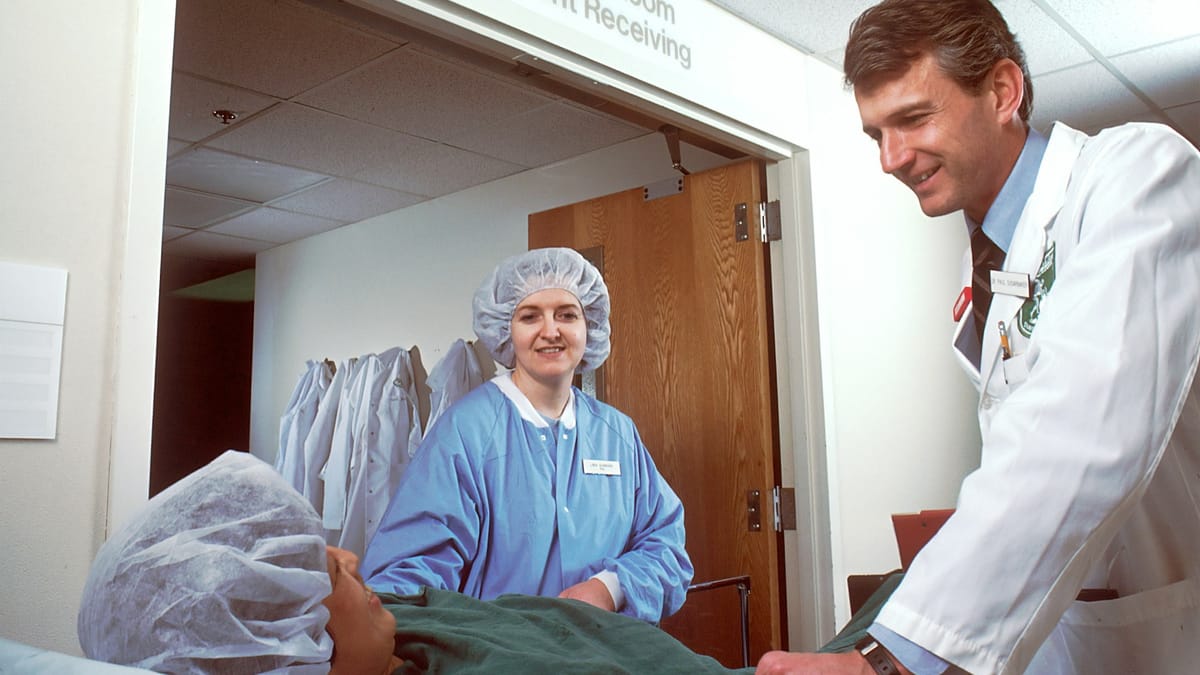Can AI Be Used for Medical Diagnosis? (The Pros and Cons)

The human body is an intricate machine, and diagnosing its malfunctions has always been a cornerstone of healthcare. From the ancient art of pulse diagnosis to the advent of modern medical imaging, our ability to identify diseases has continuously evolved. Now, on the horizon stands artificial intelligence (AI), poised to usher in a new era of medical diagnosis.
AI promises to transform how we diagnose illnesses, offering the potential for earlier detection, improved accuracy, and personalized treatment plans. Imagine a future where AI algorithms can analyze vast datasets of medical records, x-ray scans, and genetic information, identifying subtle patterns that might escape the human eye. This could lead to earlier diagnoses of diseases like cancer, allowing for more effective interventions and potentially saving lives.
However, the integration of AI into medical diagnosis is not without its challenges. Concerns surrounding data bias, the "black box" nature of some algorithms, and the ethical implications of AI-assisted healthcare require careful consideration.
This article delves deep into the world of AI-powered diagnosis, exploring both its exciting potential and the hurdles that need to be overcome. We'll examine how AI can improve diagnostic accuracy, assist with early detection, and personalize treatment plans. We'll also analyze the challenges of data bias, lack of transparency, regulatory hurdles, and ethical considerations. Finally, we'll look towards the future, envisioning a world where human expertise and AI capabilities work hand-in-hand to revolutionize medical diagnosis and ultimately lead to better patient outcomes.

Custom Software Development Services
Work with our in-house Project Managers, Software Engineers and QA Testers to build your new custom software product or to support your current workflow, following Agile, DevOps and Lean methodologies.
The Power of AI in Medical Diagnosis
AI in healthcare takes many forms, but in the realm of diagnosis, it primarily leverages machine learning algorithms. These algorithms are trained on vast datasets of medical records, imaging scans, and other clinical data. By analyzing these datasets, AI can learn to identify patterns and relationships associated with specific diseases. This allows AI to:
- Improve diagnostic accuracy: A study published in the Journal of the American Medical Association found that AI algorithms could outperform human doctors in detecting skin cancer from images, achieving an accuracy of 86% compared to 63% for dermatologists [1]. Similar studies have shown promise for AI-assisted diagnosis of other conditions like diabetic retinopathy and breast cancer.
- Assist with early detection: AI can analyze subtle changes in medical data that might be missed by the human eye. This can lead to earlier diagnoses, which is critical for improving treatment outcomes and patient survival rates. For instance, a recent study demonstrated that AI could detect signs of lung cancer in low-dose CT scans up to four years before a traditional diagnosis [2].
- Personalize treatment plans: AI can analyze a patient's medical history, genetic makeup, and other factors to predict how they might respond to different treatments. This allows for a more personalized approach to medicine, maximizing the effectiveness of treatment plans and minimizing side effects.
The numbers speak for themselves:
- A report by Accenture estimates that AI has the potential to generate $150 billion annually in savings for the US healthcare system by 2026 [3]. This translates to significant cost reductions and improved resource allocation within the healthcare system, allowing for better patient care and potentially expanded access to treatment.
- A study by Frost & Sullivan predicts that the global market for AI in healthcare will reach $67.6 billion by 2025 [4]. This rapid growth reflects the increasing investment and recognition of the potential benefits of AI in transforming healthcare.
The Challenges of AI-powered Diagnosis
While the potential of AI in medical diagnosis is undeniable, there are significant challenges that need to be addressed:
- Data bias: AI algorithms are only as good as the data they are trained on. If the training data is biased, for example, underrepresenting certain demographics or disease presentations, the AI system may also be biased, potentially leading to inaccurate diagnoses for certain populations. Mitigating bias requires careful data selection and curation during the development of AI diagnostic tools.
- Lack of transparency: Many AI algorithms are complex "black boxes" where the reasoning behind their decision-making is not readily apparent. This lack of transparency can make it difficult for doctors to understand and trust the AI's recommendations. Explainable AI (XAI) is an emerging field that aims to address this challenge by developing AI systems that can explain their reasoning in a way that is understandable to humans.
- Regulatory hurdles: The use of AI in healthcare needs to be carefully regulated to ensure patient safety and data privacy. This requires developing clear guidelines for the development, validation, and deployment of AI-powered diagnostic tools. Regulatory bodies around the world are actively working on establishing frameworks that encourage innovation while safeguarding patient well-being.
- Ethical considerations: AI raises a number of ethical questions in healthcare. For example, how should we handle situations where AI and human doctors disagree on a diagnosis? Who is ultimately responsible for a misdiagnosis made with the help of AI? Addressing these ethical considerations requires open discussions and collaboration between healthcare professionals, technologists, and ethicists to develop responsible AI practices.

Custom Software Development Services
Work with our in-house Project Managers, Software Engineers and QA Testers to build your new custom software product or to support your current workflow, following Agile, DevOps and Lean methodologies.
Here are some additional statistics to consider:
- A 2020 survey by the Pew Research Center found that only 20% of Americans believe that AI can be trusted to make important decisions about their healthcare [5]. This highlights the importance of building public trust in AI through education, transparency, and ensuring responsible development and deployment.
- A study published in Nature Medicine suggests that a significant number of healthcare professionals are concerned about the potential job displacement caused by AI [6]. However, the focus should be on AI as a tool to augment human expertise, not replace it. Doctors will continue to play a vital role in interpreting AI outputs, making diagnoses, and providing patient care.
A Future of Human-AI Collaboration
Despite the challenges, the future of medical diagnosis is likely to involve a close collaboration between humans and AI. Here's what we can expect:
- Focus on explainable AI (XAI): As mentioned earlier, XAI will be crucial for building trust and ensuring the responsible use of AI in healthcare. XAI tools will allow doctors to understand the reasoning behind an AI's recommendations, fostering a collaborative environment where human expertise and AI capabilities complement each other.
- Continuous learning and improvement: AI models need to be continuously updated with new data to maintain their accuracy and effectiveness. This requires robust data collection and feedback mechanisms that allow AI systems to learn and improve over time.
- Human oversight and clinical expertise will remain paramount: AI should not be seen as a replacement for human doctors. The final decision on diagnosis and treatment plans will always lie with qualified medical professionals. AI will function as a powerful tool to assist doctors in making faster, more accurate diagnoses, ultimately leading to better patient outcomes.
- Evolving regulations and standards: Regulatory frameworks will need to adapt to keep pace with the rapid advancements in AI technology. These frameworks should ensure the safety and efficacy of AI-powered diagnostic tools while fostering innovation in the healthcare sector.
By addressing the challenges and fostering a collaborative approach, AI has the potential to revolutionize medical diagnosis, leading to a future of earlier diagnoses, more precise treatments, and improved patient care.
Conclusion
The potential of AI in medical diagnosis is undeniable. From improving diagnostic accuracy and enabling earlier detection of diseases to facilitating personalized treatment plans, AI has the power to transform healthcare delivery. However, realizing this potential requires a collaborative approach that addresses the existing challenges.
Mitigating data bias necessitates careful data selection and ongoing monitoring to ensure AI systems represent the diversity of the patient population. The development of explainable AI (XAI) tools is crucial for building trust and fostering collaboration between human doctors and AI. Continuous learning and improvement through robust data collection and feedback mechanisms are essential for maintaining the accuracy and effectiveness of AI models. Finally, evolving regulations and standards are necessary to ensure the safety and efficacy of AI-powered diagnostic tools while fostering innovation.
As the healthcare industry embraces AI, partnering with a company that possesses the technical expertise and a deep understanding of the healthcare landscape is paramount. 4Geeks, a leading software and business growth expert, stands out as a strong partner for this journey. With their proven track record in developing custom-tailored healthcare management solutions, 4Geeks offers a comprehensive suite of services that can empower healthcare providers to leverage AI effectively. From designing secure telehealth platforms to creating user-friendly mobile apps for chronic disease management, 4Geeks can help healthcare organizations implement AI solutions that improve patient outcomes, streamline workflows, and optimize resource allocation.
The future of medical diagnosis lies in a synergistic relationship between human expertise and AI capabilities. By addressing the challenges and fostering a collaborative approach, AI has the potential to revolutionize healthcare delivery. As we move forward, 4Geeks stands ready to be a valuable partner in this transformation, helping healthcare organizations leverage the power of AI to create a future of better health for all.
FAQs
Can AI completely replace doctors in diagnosing illnesses?
No, AI is not meant to replace doctors entirely. AI excels at analyzing vast amounts of data and identifying patterns, but it lacks the critical thinking and emotional intelligence of a medical professional. The future of medical diagnosis likely involves AI assisting doctors, improving accuracy and efficiency, while doctors make the final call using their expertise and patient interaction.
Is AI-based diagnosis safe? What about mistakes?
AI is still under development in healthcare, and like any new technology, there's a potential for errors. Bias in the training data can lead to inaccurate diagnoses. However, ongoing research and development aim to improve AI's reliability. In the future, AI will likely be used alongside doctor's evaluations to minimize errors and improve patient safety.
How will AI be used in medical diagnosis?
AI can analyze medical images, patient records, and genetic information to identify patterns and potential illnesses. This can aid in earlier detection of diseases like cancer, allowing for quicker interventions and potentially saving lives. AI can also suggest treatment plans tailored to individual patients.




